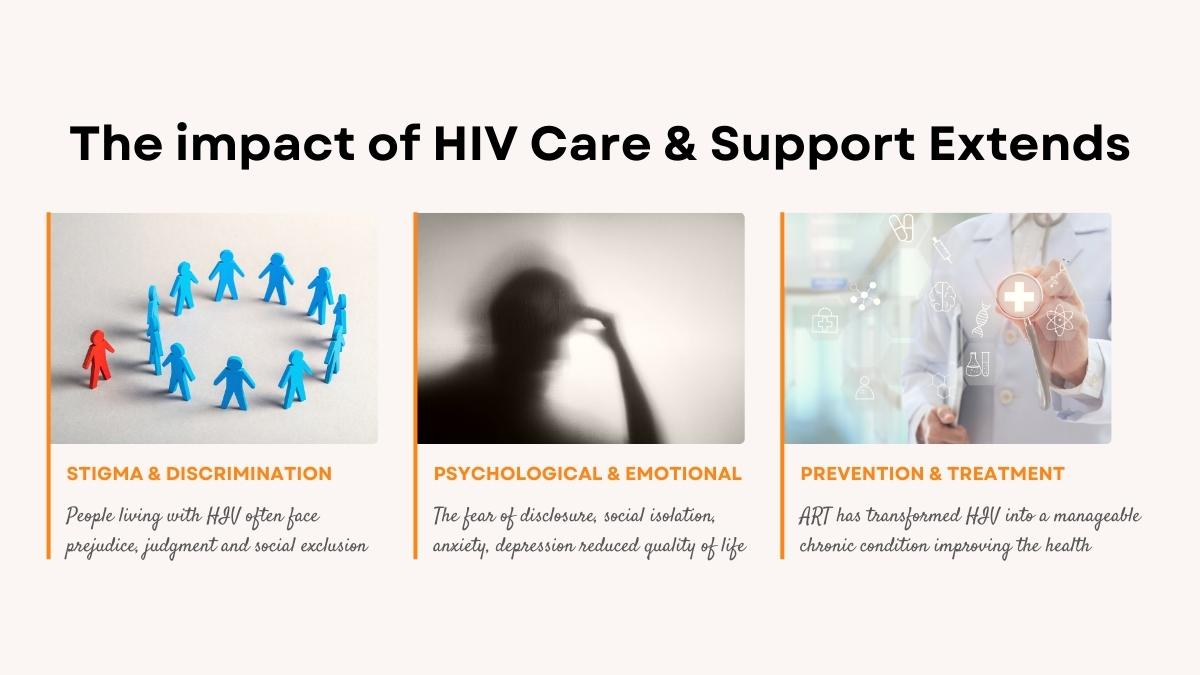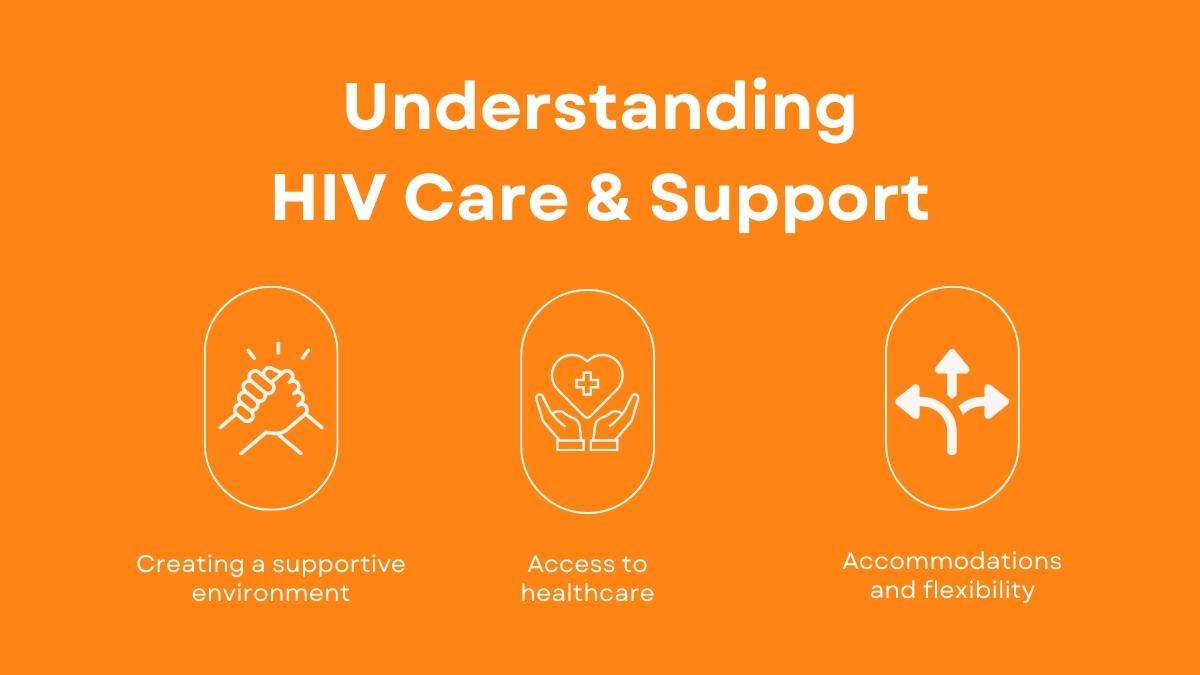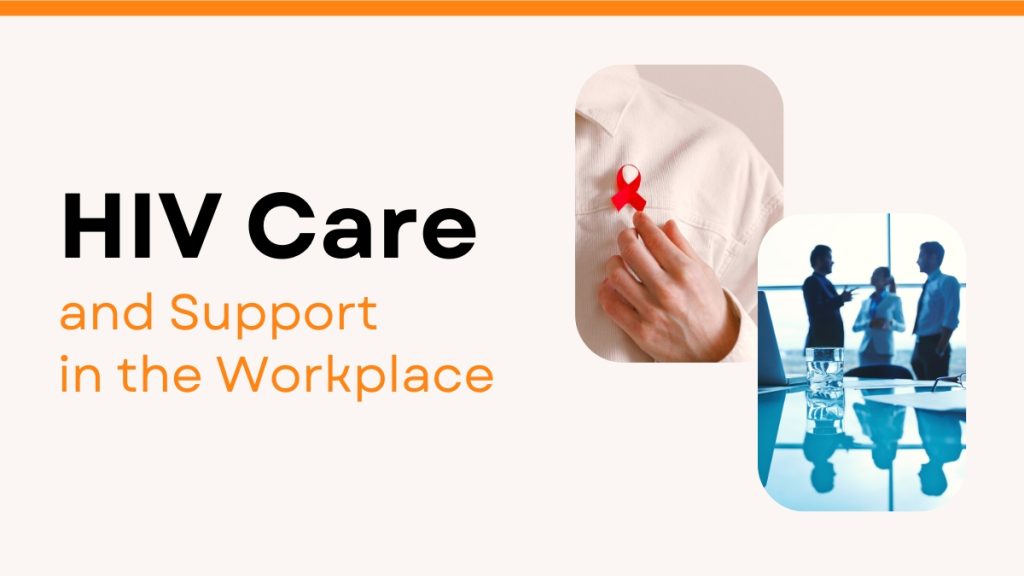HIV Care & Support in the Workplace. Human Immunodeficiency Virus (HIV) is a viral infection that attacks the immune system, specifically targeting CD4 cells, a type of white blood cell crucial for fighting infections. If left untreated, HIV can progress to Acquired Immunodeficiency Syndrome (AIDS), a condition characterized by severe immune system damage, leaving individuals vulnerable to opportunistic infections and cancers.
The impact of HIV Care & Support extends
The impact of HIV extends beyond the physical health of affected individuals. It also has significant social, economic, and psychological implications. Here are some key points to consider


- Global HIV Epidemic
- HIV has reached pandemic proportions, affecting millions of people worldwide. According to the Joint United Nations Programme on HIV/AIDS (UNAIDS), approximately 38 million people were living with HIV globally as of 2020. Sub-Saharan Africa remains the most heavily affected region, but the virus has a global presence.
- Stigma and Discrimination
- HIV has been marred by stigma and discrimination since its emergence. People living with HIV often face prejudice, judgment, and social exclusion due to misconceptions and fear surrounding the virus. Stigma can prevent individuals from seeking testing, treatment and support. Leading to further spread of the infection.
- Health Implications
- HIV weakens the immune system, making individuals susceptible to various infections and illnesses. Common opportunistic infections include tuberculosis, pneumonia, and certain cancers. HIV can also affect neurological health, leading to cognitive impairments and neurological disorders.
- Psychological and Emotional Impact
- Individuals living with HIV may experience psychological and emotional challenges. The fear of disclosure, social isolation, anxiety, depression, and reduced quality of life are common among those living with HIV. Addressing mental health needs alongside physical health is crucial for comprehensive care.
- Economic Burden
- The economic impact of HIV is significant. Individuals living with HIV may face increased healthcare costs, reduced productivity, and limited employment opportunities due to stigma and discrimination. Additionally, communities and countries bear the burden of providing healthcare, prevention, and support services.
- Prevention and Treatment Advances
- Over the years, significant progress has been made in HIV prevention and treatment. Antiretroviral therapy (ART) has transformed HIV into a manageable chronic condition, improving the health and life expectancy of individuals living with HIV. Prevention strategies, such as condom use, needle exchange programs, and pre-exposure prophylaxis (PrEP), have helped reduce new HIV infections.
Despite these advancements, challenges persist in combating the HIV epidemic. Navigating the impact of HIV in the workplace requires understanding, compassion, and proactive measures to provide comprehensive care and support to employees living with HIV.
Importance of creating an inclusive workplace for individuals living with HIV
Creating an inclusive workplace for individuals living with HIV is of paramount importance. Here are several key reasons why it is crucial:
Equal Opportunities
Creating an inclusive workplace ensures that individuals living with HIV have equal access to employment opportunities, career advancement, and professional development. By eliminating discrimination and fostering a supportive environment, employers can ensure that employees living with HIV have the same chances to thrive and contribute to their full potential.
Human Rights and Dignity
Every individual, regardless of their HIV status, deserves to be treated with dignity and respect. By fostering an inclusive workplace, employers uphold the fundamental human rights of employees living with HIV and help to eradicate the stigma and discrimination associated with the virus.
Retention and Productivity
Employees who feel supported and valued in the workplace are more likely to remain engaged and committed to their work. By creating an inclusive environment, employers can improve employee retention rates and boost productivity. When employees living with HIV are provided with necessary support and accommodations, they can focus on their work without the added burden of stigma and discrimination.

Health and Well-being
A supportive workplace can positively impact the physical and mental health of employees living with HIV. Access to healthcare benefits, reasonable accommodations, and support networks can contribute to better health outcomes and overall well-being. Employees who are effectively managing their HIV can lead healthier lives and contribute more effectively to their work.
Reduced HIV Transmission
An inclusive workplace can play a role in reducing the transmission of HIV. By promoting HIV education, prevention, and testing initiatives, employers can create awareness and empower employees to take preventive measures. Additionally, workplaces that prioritize the well-being of their employees may offer resources such as access to condoms, education on safer sex practices, and support for HIV testing and counseling.
Positive Workplace Culture
Embracing diversity and inclusion enhances the overall workplace culture. By valuing employees regardless of their HIV status, employers foster an environment of acceptance, empathy, and understanding. This not only benefits employees living with HIV but also creates a supportive atmosphere for all employees, fostering teamwork, collaboration, and innovation.
Legal and Ethical Obligations
Employers have legal obligations to protect employees from discrimination based on their HIV status. Laws and regulations vary across countries, but many jurisdictions prohibit HIV-related discrimination in employment. Creating an inclusive workplace is not only ethically sound but also helps organizations comply with legal requirements and avoid potential legal consequences.
Creating an inclusive workplace for individuals living with HIV is essential to uphold human rights, promote equality, and provide a supportive environment that enables employees to thrive. By fostering understanding, eliminating stigma, and implementing supportive policies, employers can contribute to the well-being and success of employees living with HIV while cultivating a positive and inclusive work culture for all.
Understanding HIV Care & Support
Defining HIV Care and Support
- HIV care: HIV care refers to the medical and healthcare services provided to individuals living with HIV. It includes the diagnosis, treatment, and management of HIV infection and related health conditions.
- HIV support: HIV support encompasses the non-medical services and resources that aim to address the psychosocial. Emotional and practical needs of individuals living with HIV. It includes counseling, peer support, education, and assistance with navigating social and financial challenges.
The Role of Employers in Providing HIV Care and Support
- Creating a supportive environment: Employers play a crucial role in fostering a workplace culture that is accepting. Supportive of employees living with HIV. This involves promoting non-discrimination, confidentiality, and privacy, as well as implementing policies and practices that ensure equal treatment and opportunities.
- Access to healthcare: Employers can provide access to healthcare benefits. Insurance coverage that specifically address the healthcare needs of employees living with HIV. This may include coverage for antiretroviral therapy (ART), regular medical check-ups, and specialized HIV care providers.
- Accommodations and flexibility: Employers should consider reasonable accommodations to support employees in managing their HIV. Such as allowing time off for medical appointments, adjusting work schedules, or providing a safe. Supportive environment for medication storage and administration.

Legal Considerations and Anti-Discrimination Policies
- Anti-discrimination laws: Employers need to be aware of local, national and international laws. That protect individuals living with HIV from discrimination in the workplace. These laws vary across jurisdictions but generally prohibit discrimination based on HIV status in hiring, promotion, job assignments, and termination.
- Confidentiality and privacy: Employers have a legal and ethical obligation to maintain confidentiality and privacy regarding an employee’s HIV status. Implementing policies and procedures to protect sensitive health information is crucial to prevent unauthorized disclosure and discrimination.
- Reasonable Accommodations: In many jurisdictions, employers are legally required to provide reasonable accommodations to employees living with HIV. Ensuring they have equal opportunities and can perform their job duties effectively. This may involve modifying work schedules, providing flexibility in job tasks, or making physical workplace adjustments.
Understanding HIV care and support is essential for employers to effectively meet the needs of employees living with HIV. By recognizing the medical and non-medical aspects of care. Fulfilling their role in providing support and complying with legal requirements. Employers can contribute to the well-being and success of employees living with HIV. While promoting an inclusive and equitable workplace environment.

